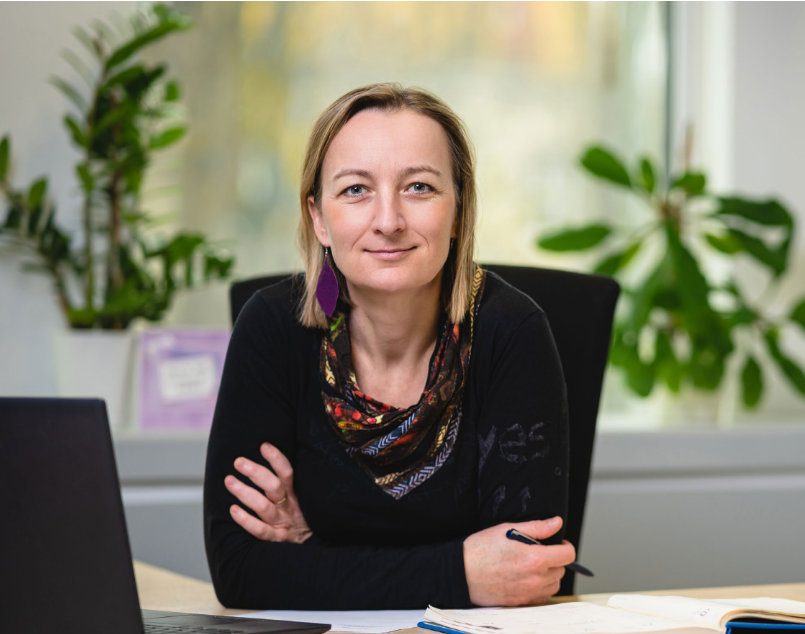Driving Progress: The Role of the Grants Office in IIMCB’s Achievements
In 2023, the International Institute of Molecular and Cell Biology in Warsaw celebrated a year of remarkable achievements, with the Grants Office (GO) involved in securing funding for groundbreaking projects. Meet Dorota Libiszowska, the Head of IIMCB's Grants Office, and see her formula for fostering a successful team spirit.
The RACE project was a significant milestone for the IIMCB in 2023, with the Grants Office playing a pivotal role in securing this crucial funding. Could you share some insights into how the Grants Office contributed to this success?
Indeed, the Grants Office was fully engaged in creating RACE. We were part of the proposal writing team, along with our directors and two lab leaders, where everyone contributed. GO ensured that the agreed ideas were structured in the proposal according to the call’s rules. We wrote different parts of the application, prepared the budget, coordinated works in time, and liaised with our RACE partners, external consultants, and internal colleagues who also contributed with their expertise. It was quite a demanding, but fantastic and insightful teamwork experience that will continue now that RACE has been funded and is being implemented.
Could you summarize 2023 in terms of grants and how they have contributed to the IIMCB's general goals?
It was an intense but successful year. We have had over 50 ongoing grants, 10 initiated in 2023, and we have submitted 30 new proposals. Our research projects were primarily funded by domestic sources including National Science Centre, the Foundation for Polish Science, the Polish Science Fund, the Polish National Agency for Academic Exchange. Additionally, our researchers secured grants from international sources. Our pearls include ERC Advanced Grant, EIC Transition from Horizon Europe, and two Installation Grants from EMBO. Importantly, 2023 was a remarkable year for the application and securing of strategic institutional grants. These include running RACE project, the recently awarded RACE-PRIME from International Research Agenda Programme of the Foundation for Polish Science, and still under evaluation, project of the Polish Roadmap for Research Infrastructure from the Recovery and Resilience Plan. These grants will greatly facilitate the realization of our ambitious vision for the scientific and institutional development of IIMCB.
Could you tell us more about the people behind the Grant Office?
As the IIMCB has been growing over the years, so has the GO. Now, we are a team of eight members, and I have the honor of collaborating with fantastic colleagues who are professional, caring, and fun. Our job requires a blend of managerial, technical, and soft skills. We excel as grant writers, financial experts, and interpreters of complex regulations. With meticulous attention to detail, we navigate through extensive paperwork and Excel spreadsheets, consistently resolving challenges and ensuring compliance with external and internal procedures. Our goal is to streamline administrative processes for researchers while delivering optimal solutions with minimal hassle.
How does the GO identify and secure key funding opportunities?
We conduct weekly monitoring of funding opportunities. Upon announcement, we analyze each call and disseminate key information to potential applicants - our researchers, relevant units, or directors. In case of research projects, the GO primarily focuses on ensuring the accuracy of all formal and financial aspects. However, for institutional non-scientific grants, GO and other administrative teams' collaborative engagment and thus contribution to the grant success is much more significant.
What core support does your office provide to researchers during grant applications?
Each applying Principal Investigator receives personalized support from our team members. We guide scientists through proposal requirements, establish internal deadlines, complete formal sections, and develop budgets. We also facilitate connections with internal units contributing to the proposal, interpret grant rules, and liaise with funding agencies when needed. For grants like MSCA Individual Fellowships, we offer strategic advice and coaching to scientists. Finally, we oversee the collection of signatures and navigate the grant submission. Nowadays, grant proposals are increasingly complex. Besides scientific parts they often include sections on ethics, data management, communication, or gender. The role of the GO is to collaborate closely with colleagues across different units for their expertise and ingrate all these aspects in compliance with grant agency regulations.
What are the Grants Office main goals for the future, and how are you preparing for emerging trends in funding?
I envision two primary goals. First, we want to maximize the potential of RACE and related complementary projects. Secondly, regardless of evolving funding trends, we want to steadily support our researchers and the IIMCB in securing grants, ensuring optimal use of funds, and facilitating desired outcomes.
RACE project: RNA and Cell Biology - from Fundamental Research to Therapies
Funded by the European Union. Views and opinions expressed are however those of the author(s) only and do not necessarily reflect those of the European Union or the European Research Executive Agency. Neither the European Union nor the granting authority can be held responsible for them.
RACE-PRIME project: RNA and Cell Biology Platform for Research and Innovation in Medicine


